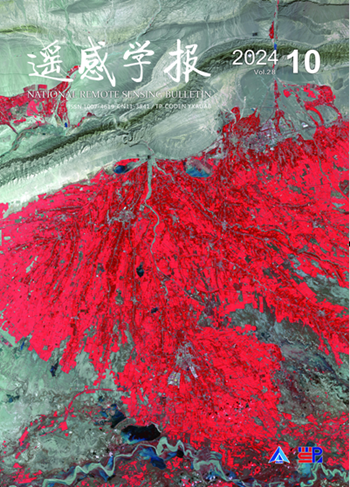Direct Retrieval of NO2 Vertical Columns from UV-Vis (390-495 nm) Spectral Radiances Using a Neural Network
引用次数: 4
Abstract
Satellite retrievals of columnar nitrogen dioxide (NO2) are essential for the characterization of nitrogen oxides (NOx) processes and impacts. The requirements of modeled a priori profiles present an outstanding bottleneck in operational satellite NO2 retrievals. In this work, we instead use neural network (NN) models trained from over 360,000 radiative transfer (RT) simulations to translate satellite radiances across 390-495 nm to total NO2 vertical column (NO2C). Despite the wide variability of the many input parameters in the RT simulations, only a small number of key variables were found essential to the accurate prediction of NO2C, including observing angles, surface reflectivity and altitude, and several key principal component scores of the radiances. In addition to the NO2C, the NN training and cross-validation experiments show that the wider retrieval window allows some information about the vertical distribution to be retrieved (e.g., extending the rightmost wavelength from 465 to 495 nm decreases the root-mean-square-error by 0.75%) under high-NO2C conditions. Applying to four months of TROPOMI data, the trained NN model shows strong ability to reproduce the NO2C observed by the ground-based Pandonia Global Network. The coefficient of determination (R2, 0.75) and normalized mean bias (NMB, -33%) are competitive with the level 2 operational TROPOMI product (R2=0.77, NMB=−29%) over clear (geometric cloud fraction<0.2) and polluted (NO2C≥7.5×1015 molecules/cm2) regions. The NN retrieval approach is ~12 times faster than predictions using high spatial resolution (~3 km) a priori profiles from chemical transport modeling, which is especially attractive to the handling of large volume satellite data.利用神经网络直接检索UV-Vis (390- 495nm)光谱辐射的NO2垂直柱
柱状二氧化氮(NO2)的卫星反演对于表征氮氧化物(NOx)过程及其影响至关重要。模拟的先验剖面的要求是运行卫星NO2检索的突出瓶颈。在这项工作中,我们使用从超过360,000次辐射传输(RT)模拟中训练出来的神经网络(NN)模型,将390-495 nm的卫星辐射转化为总NO2垂直柱(NO2C)。尽管RT模拟中的许多输入参数具有很大的变异性,但只有少数关键变量对NO2C的准确预测至关重要,包括观测角度、地表反射率和海拔高度,以及辐射度的几个关键主成分得分。除了NO2C,神经网络训练和交叉验证实验表明,在高NO2C条件下,更宽的检索窗口允许检索一些关于垂直分布的信息(例如,将最右边的波长从465 nm扩展到495 nm,可使根均方误差降低0.75%)。应用4个月的TROPOMI数据,训练后的神经网络模型对地面Pandonia Global Network观测到的NO2C具有较强的再现能力。在透明(几何云分数<0.2)和污染(NO2C≥7.5×1015分子/cm2)区域,决定系数(R2, 0.75)和归一化平均偏差(NMB, -33%)与二级操作TROPOMI产品(R2=0.77, NMB= - 29%)具有竞争力。神经网络检索方法比使用高空间分辨率(~3公里)化学输运模型的先验剖面预测快约12倍,这对于处理大量卫星数据特别有吸引力。
本文章由计算机程序翻译,如有差异,请以英文原文为准。
求助全文
约1分钟内获得全文
求助全文
来源期刊

遥感学报
Social Sciences-Geography, Planning and Development
CiteScore
3.60
自引率
0.00%
发文量
3200
期刊介绍:
The predecessor of Journal of Remote Sensing is Remote Sensing of Environment, which was founded in 1986. It was born in the beginning of China's remote sensing career and is the first remote sensing journal that has grown up with the development of China's remote sensing career. Since its inception, the Journal of Remote Sensing has published a large number of the latest scientific research results in China and the results of nationally-supported research projects in the light of the priorities and needs of China's remote sensing endeavours at different times, playing a great role in the development of remote sensing science and technology and the cultivation of talents in China, and becoming the most influential academic journal in the field of remote sensing and geographic information science in China.
As the only national comprehensive academic journal in the field of remote sensing in China, Journal of Remote Sensing is dedicated to reporting the research reports, stage-by-stage research briefs and high-level reviews in the field of remote sensing and its related disciplines with international and domestic advanced level. It focuses on new concepts, results and progress in this field. It covers the basic theories of remote sensing, the development of remote sensing technology and the application of remote sensing in the fields of agriculture, forestry, hydrology, geology, mining, oceanography, mapping and other resource and environmental fields as well as in disaster monitoring, research on geographic information systems (GIS), and the integration of remote sensing with GIS and the Global Navigation Satellite System (GNSS) and its applications.
 求助内容:
求助内容: 应助结果提醒方式:
应助结果提醒方式:


